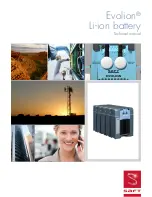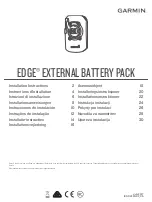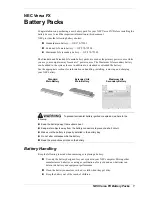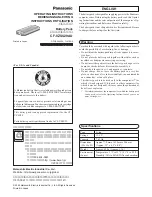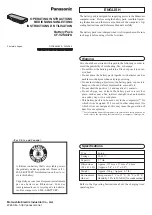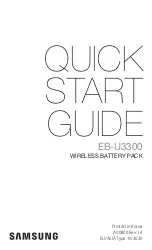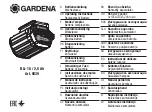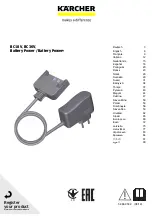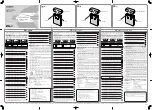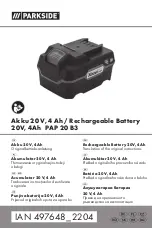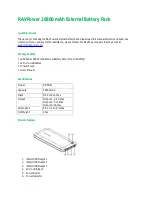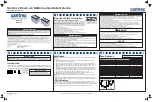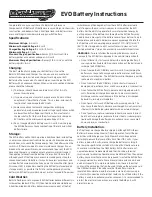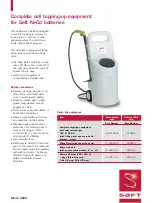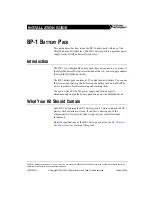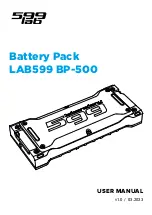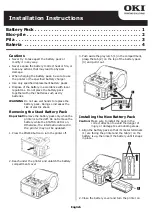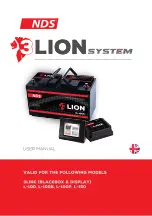
12
4.5 Internal heater
The Evolion uses an internal heater to optimize its performance. The internal heater operates as a function of the measured module
temperature. It works in all modes of operation except sleep and safe modes. The load to the heater is supplied from the 48 Vdc
circuit. Approximately 60 Watts of heat is generated when the heater is ON.
The internal heater raises the module temperature at a rate of approximately 8ºC per hour (14.4ºF per hour) and can be considered
linear between - 40ºC to + 10ºC (heater operation range). Never apply external insulation around the Evolion. This may cause local
overheating or local hot spots that could damage the module.
4.6 Cell balancing
The Evolion is equipped with automatic and dynamic cell balancing circuits. The cell balancing is active in charge and floating modes
and it is not active in discharge mode. It is also intermittently active while the module is in storage. A separate balancing circuit is
applied to each cell. The cell balancing is only active for cells that are too high in voltage.
During cell balancing, the extra energy supplied from the high voltage cell is dissipated as heat.
Cell balancing is not active all the time. The cell balancing process starts when,
•
cell voltage is greater than or equal to 3.5 V AND
•
module temperature is less than 55ºC (131ºF) AND
•
cell voltage is greater than or equal to 30 mV higher than the lowest cell voltage
The cell balancing process stops when,
•
cell voltage is lower than 3.5 V OR
•
module temperature is above 55ºC (131ºF) OR
•
cell voltage is less than or equal to 20 mV higher than the lowest cell voltage.
The balancing current for a single cell ranges between 75 mA to 85 mA. It operates by loading a single cell with 46.5 Ω and is only
active between 3.5 Vpc to 4.0 Vpc during charge. If any cell voltage ever increases higher than 100 mV from the lowest cell voltage, the
unbalanced cell alarm will be activated by the BMST.
In sleep mode, while the Evolion is in storage, cell balancing occurs automatically. Every hour, the system automatically checks if the
balancing process needs to be activated. This feature allows the Evolion to begin normal operation in the application, even after a long
storage period, without the need to do an equalization charge.
4.7 System level and cell level current interrupt devices
Each cell includes a current interrupt that is actuated, automatically, if the internal cell pressure exceeds 9 ± 2 bars or if the cell
current exceeds 180 Amps. If the current interrupt of one cell opens, the current to the Evolion module will stop.
Additionally, there are 3 system level current interrupt devices included in each Evolion. The redundant devices include the (a)
electronic switch - mosfets (primary) and (b) a 60 Amp user replaceable fuse (secondary) and (c) and a 75 Amp fuse (tertiary); built into
the BMST busbar board and it is not replaceable.
For example, if a safety value, i.e., current, voltage, temperature, etc., is exceeded for up to a period of 1 second, the electronic
switch (primary current interrupt) will operate open (safe mode). When it operates, it can tolerate current up to 130 Amps (charge or
discharge). If it operates when the current is higher than this, damage may occur.
The secondary current interrupt device is the 60 A replaceable fuse (See section Front cover features). Figure 4 illustrates the opening
characteristics of the primary and secondary interrupt devices.
Heater ON when the module temperature is below
10ºC (50ºF)
Heater OFF when the module temperature is above
15ºC (59ºF)
Heater load (Float charge mode)
1.1 Amps
Heater load (Discharge mode)
1.0 Amps

